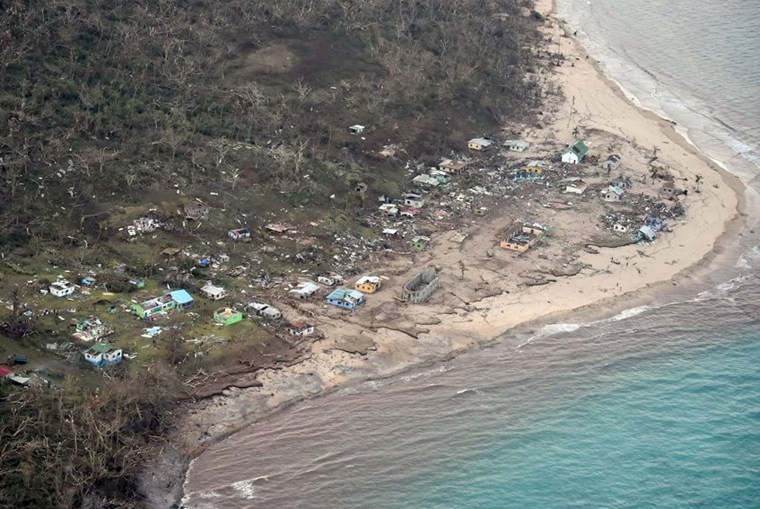For Viva Tatawaqa and women like her, climate change is not a question of when. According to the activist from Fiji, it's a question of survival.
“Like how can we survive a day? How do you maintain yourself and at the same time make sure you’re surviving in your life and what’s happening around you?” Tatawaqa, a member of Diverse Voices and Action for Equality in Fiji, told NBC News.
"We can overcome this by working in solidarity with one another and calling on the governments of the day to act fast by financing climate change efforts.”
Tatawaqa was one of the activists attending the United Nation’s 61st Commission on the Status of Women in New York City in March. In Fiji and other Pacific Island nations, climate change has taken hold of communities — from rising sea levels to droughts and substandard rainy seasons, she said.
“We are angry. We are frustrated, because it’s still like an issue for some people, for some countries. It’s not an issue anymore,” Tatawaqa said.
People's livelihoods in Pacific Island nations depend on the ocean and their surroundings, she noted. But it’s not just food security; climate change and its effects enter every aspect of life for women in Fiji.
“You have women who leave home in the early hours of the morning to go out and fish and stay out by the ocean for the whole day and then come back to the home," Tatawaqa said. "That’s affecting their health, which is why we are really working hard to link climate change with sexual reproductive health and rights.”
Women put themselves into harmful situations and aren’t recognized for what they are risking every day just to support their families and survive, she added.
As an example, Tatawaqa said, on one island in Eastern Fiji, women are still living in tents after their homes were destroyed last year in Cyclone Winston, the strongest recorded tropical storm to ever reach land in the island nation.
RELATED: Fiji Cleans Up After Cyclone Winston Kills 17, Flattens Villages
Some pregnant women living in rural areas are forced to leave their families at the sixth or seventh-month mark to deliver the baby in the city, she added. Because of the rising sea levels, the health centers have been built on high land, making it difficult for a six-month pregnant woman to reach, Tatawaqa said. And when the women leave their older children at home with another caregiver, violence may be an issue.
“It’s not just about ecological,” Tatawaqa said. “It’s about the impact that is happening internally in peoples’ lives and women’s lives, mentally and physically.” She noted that many organizations — nationally, regionally and internationally — are working specifically on gender climate justice.
The White House's recent budget proposal would cut funding for the Global Climate Change Initiative, a program that the Obama administration started after the Paris climate agreement. President Donald Trump is expected to sign an executive order Tuesday that rolls back and reviews former President Barack Obama's climate rules.
In Papua New Guinea, climate change has contributed to rising sea levels, droughts, landslides, and loss of food crops due to heavy rains or severe drought, according to Helen Hakena, executive director of Leitana Nehan Women's Development Agency, a non-government organization in Bougainville.
RELATED: Pacific Islander Poets Use Art, Stories to Urge Climate Action at UN Conference
"In [Papua New Guinea], climate change has caused a disproportional and devastating impact on women’s lives – properties have been lost and damaged by storms, land, earth quakes and soil erosion and livelihoods devastated,” she told NBC News. “Climate change issues in the country are being discussed by the PNG government and programmes and implementation of the Paris agreement is being done.”
Hakena said women are affected by climate change in several ways: working longer hours in gardens to look for food as crops are not as good, walking long distances to collect food and firewood for cooking and water, and rising sea levels and floods decreasing fishing resources.
Flooding causes lower food production, she noted, which affects families and can further affect the level of gender-based violence.
“Cash poverty and health risks increase,” she said.
“You have women who leave home in the early hours of the morning to go out and fish and stay out by the ocean for the whole day and then come back to the home."
The Leitana Nehan Women's Development Agency works with Papua New Guinea's government to create awareness within communities about the impacts of climate change and develop policies. The organization also works with women’s and youth groups to discuss how they can overcome the challenges.
She said events like the UN’s Commission on the Status of Women help amplify women’s voices.
“Women living (in) the Pacific Rim face or experience the impacts of climate change daily — we suffer the consequences of severe storms, floods, soil erosion, sinking islands, malnutrition, malaria, and shortage of food,” she said. “We can overcome this by working in solidarity with one another and calling on the governments of the day to act fast by financing climate change efforts.”
Follow NBC Asian America on Facebook, Twitter, Instagram and Tumblr.
